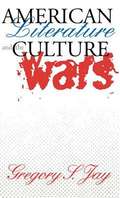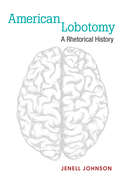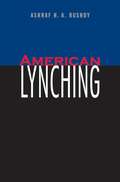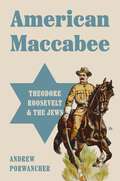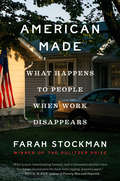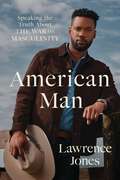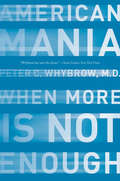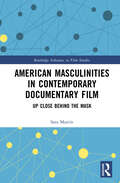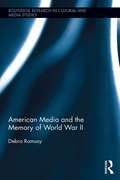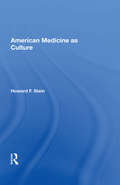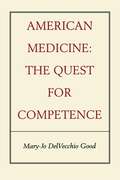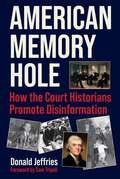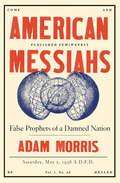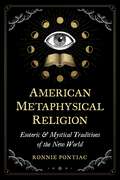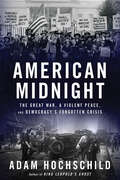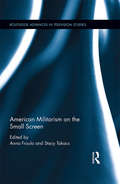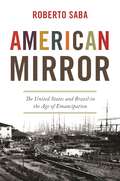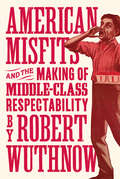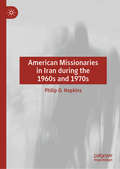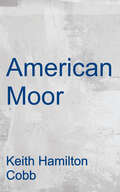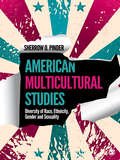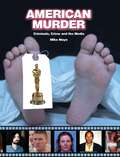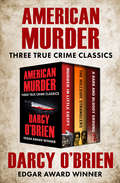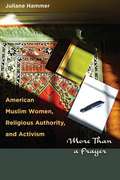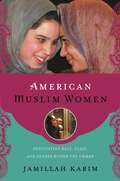- Table View
- List View
American Literature and the Culture Wars
by Gregory S. JayIn this book the author states that he will be: "...questioning both the scope and the purpose of American literary studies. What ends do we pursue in the study and teaching of an "American" literature? Has the idea of a canon of great books reached the end of its usefulness? Where does American literature end and Mexican or Caribbean or Canadian or postcolonial literature begin? Is multiculturalism the end of civilization as we know it or the start of an overdue regeneration of our politics and pedagogy? How has the political economy of making ends meet in an era of downsizing and privatization affected academic freedom and the course of academic study? What happens in the classroom when we try to put an end to the conventional ways in which we have conceived and taught our subject? Playing off the pun in the title of this introduction, then, I want to explore this set of questions about the "ends" of American literary studies. This exploration includes rethinking our ends both in the nominal sense of "pragmatic intention" (goal, aim, objective, design, scheme) and in the verbal sense of "reaching a conclusion" (limit, terminate, cease, halt, expire). By focusing attention on these many ends and the controversial issues they involve, I hope in part to explain how this once arcane academic discipline ended up at the center of the culture wars."
American Lobotomy: A Rhetorical History
by Jenell JohnsonAmerican Lobotomy studies a wide variety of representations of lobotomy to offer a rhetorical history of one of the most infamous procedures in the history of medicine. The development of lobotomy in 1935 was heralded as a "miracle cure" that would empty the nation's perennially blighted asylums. However, only twenty years later, lobotomists initially praised for their "therapeutic courage" were condemned for their barbarity, an image that has only soured in subsequent decades. Johnson employs previously abandoned texts like science fiction, horror film, political polemics, and conspiracy theory to show how lobotomy's entanglement with social and political narratives contributed to a powerful image of the operation that persists to this day. The book provocatively challenges the history of medicine, arguing that rhetorical history is crucial to understanding medical history. It offers a case study of how medicine accumulates meaning as it circulates in public culture and argues for the need to understand biomedicine as a culturally situated practice.
American Lynching
by Ashraf H. RushdyA history of lynching in America over the course of three centuries, from colonial Virginia to twentieth-century Texas.After observing the varying reactions to the 1998 death of James Byrd Jr. in Texas, called a lynching by some, denied by others, Ashraf Rushdy determined that to comprehend this event he needed to understand the long history of lynching in the United States. In this meticulously researched and accessibly written interpretive history, Rushdy shows how lynching in America has endured, evolved, and changed in meaning over the course of three centuries, from its origins in early Virginia to the present day.&“A work of uncommon breadth, written with equally uncommon concision. Excellent.&” —N. D. B. Connolly, Johns Hopkins University&“Provocative but careful, opinionated but persuasive . . . Beyond synthesizing current scholarship, he offers a cogent discussion of the evolving definition of lynching, the place of lynchers in civil society, and the slow-in-coming end of lynching. This book should be the point of entry for anyone interested in the tragic and sordid history of American lynching.&” —W. Fitzhugh Brundage, author of Lynching in the New South: Georgia and Virginia, 1880-1930&“A sophisticated and thought-provoking examination of the historical relationship between the American culture of lynching and the nation&’s political traditions. This engaging and wide-ranging meditation on the connection between democracy, lynching, freedom, and slavery will be of interest to those in and outside of the academy.&” —William Carrigan, Rowan University&“In this sobering account, Rushdy makes clear that the cultural values that authorize racial violence are woven into the very essence of what it means to be American. This book helps us make sense of our past as well as our present.&” —Jonathan Holloway, Yale University
American Maccabee: Theodore Roosevelt and the Jews
by Andrew PorwancherA major biography of a mesmerizing statesman whose complex bond with the Jewish people forever shaped their lives—and his legacyA scion of the Protestant elite, Theodore Roosevelt was an unlikely ally of the waves of impoverished Jewish newcomers who crowded the docks at Ellis Island. Yet from his earliest years he forged ties with Jews never before witnessed in a president. American Maccabee traces Roosevelt&’s deep connection with the Jewish people at every step of his dazzling ascent. But it also reveals a man of contradictions whose checkered approach to Jewish issues was no less conflicted than the nation he led.As a rising political figure in New York, Roosevelt barnstormed the Lower East Side, giving speeches to packed halls of Jewish immigrants. He rallied for reform of the sweatshops where Jewish laborers toiled for pitiful wages in perilous conditions. And Roosevelt repeatedly venerated the heroism of the Maccabee warriors, upholding those storied rebels as a model for the American Jewish community. Yet little could have prepared him for the blood-soaked persecution of Eastern European Jews that brought a deluge of refugees to American shores during his presidency. Andrew Porwancher uncovers the vexing challenges for Roosevelt as he confronted Jewish suffering abroad and antisemitic xenophobia at home.Drawing on new archival research to paint a richly nuanced portrait of an iconic figure, American Maccabee chronicles the complicated relationship between the leader of a youthful nation and the people of an ancient faith.
American Made: What Happens to People When Work Disappears
by Farah StockmanWhat happens when Americans lose their jobs? In this illuminating story of ruin and reinvention, Pulitzer Prize-winning journalist Farah Stockman gives an up-close look at the profound role work plays in our sense of identity and belonging, as she follows three workers whose lives unravel when the factory they have dedicated so much to closes down. &“With humor, breathtaking honesty, and a historian&’s satellite view, Stockman illuminates the fault lines ripping America apart.&”—Beth Macy, author of Factory Man and DopesickShannon, Wally, and John built their lives around their place of work. Shannon, a white single mother, became the first woman to run the dangerous furnaces at the Rexnord manufacturing plant in Indianapolis, Indiana, and was proud of producing one of the world&’s top brands of steel bearings. Wally, a black man known for his initiative and kindness, was promoted to chairman of efficiency, one of the most coveted posts on the factory floor, and dreamed of starting his own barbecue business one day. John, a white machine operator, came from a multigenerational union family and clashed with a work environment that was increasingly hostile to organized labor.The Rexnord factory had served as one of the economic engines for the surrounding community. When it closed, hundreds of people lost their jobs. What had life been like for Shannon, Wally, and John, before the plant shut down? And what became of them after the jobs moved to Mexico and Texas? American Made is the story of a community struggling to reinvent itself. It is also a story about race, class, and American values, and how jobs serve as a bedrock of people&’s lives and drive powerful social justice movements. This revealing book shines a light on a crucial political moment, when joblessness and anxiety about the future of work have made themselves heard at a national level. Most of all, it is a story about people: who we consider to be one of us and how the dignity of work lies at the heart of who we are.
American Man: Speaking the Truth about the War on Masculinity
by Lawrence JonesFox & Friends cohost Lawrence Jones delivers the common sense book America needs more than ever in this definitive takedown of the left&’s never-ending attacks on masculinity. A generation ago it was understood that men and women were unique, yet interdependent, and designed by God to be that way. Today, the woke crowd wants you to believe masculinity is &“toxic.&” In his first book, Lawrence embarks on a thorough examination of who is doing the attacking and why. Informed by his travels across the country for Fox News, Lawrence explains how confused progressives are about manhood—and how powerful the need is to set the record straight. Men, he argues, are indispensable to thriving families and prosperous societies, and the sooner men start acting like men, the better off we all will be. Packed with stories from his own life and work, Lawrence makes a persuasive case for the virtues of manliness—courage, resilience, godliness, and self-reliance among others. Lawrence challenges his fellow men to live up to their responsibilities as men and to fill the cultural void woke ideologues have been happy to exploit. In confronting the chaos of contemporary culture, Lawrence is forced to reexamine his own beliefs as he spurs an honest discussion about what it means to be a man in America. The book also includes candid, never-before-shared interviews conducted by Lawrence of his Fox News colleagues, like Sean Hannity, Mark Levin, Pete Hegseth, Will Cain, as well as other prominent voices like NFL great Ben Watson and actor Dean Cain. This insightful and uncompromising book from one of the country&’s fastest rising stars will enlighten and inspire readers—as it proves once and for all the crucial role men can and must play in American life today.
American Mania: When More is Not Enough
by Peter C. WhybrowA doctor's bold analysis of the cultural disease that afflicts us all. Despite an astonishing appetite for life, more and more Americans are feeling overworked and dissatisfied. In the world's most affluent nation, epidemic rates of stress, anxiety, depression, obesity, and time urgency are now grudgingly accepted as part of everyday existence they signal the American Dream gone awry. Peter C. Whybrow, director of the Neuropsychiatric Institute at UCLA, grounds the extraordinary achievements and excessive consumption of the American nation in an understanding of the biology of the brain's reward system offering for the first time a comprehensive and physical explanation for the addictive mania of consumerism. American Mania presents a clear and novel vantage point from which to understand the most pressing social issues of our time, while offering an informed approach to refocusing our pursuit of happiness. Drawing upon rich scientific case studies and colorful portraits, "this fascinating and important book will change the way you think about American life" (Karen Olson, Utne Reader).
American Masculinities in Contemporary Documentary Film: Up Close Behind the Mask (Routledge Advances in Film Studies)
by Sara MartínMost documentaries deal with men, but what do they actually say about masculinity? In this groundbreaking volume Sara Martín analyses more than forty 21st-century documentaries to explore how they represent American men and masculinity. From Jennifer Siebel Newsom’s The Mask You Live In to Raoul Peck’s I Am Not Your Negro, this volume explores sixteen different faces of American masculinity: the good man, the activist, the politician, the whistleblower, the criminal, the sexual abuser, the wrongly accused, the dependent man, the soldier, the capitalist, the adventurer, the sportsman, the architect, the photographer, the musician, and the writer. The collective portrait drawn by the documentaries discloses a firm critical stance against the contradictions inherent in patriarchy, which makes American men promises of empowerment it cannot fulfill. The filmmakers’ view of American masculinity emphasizes the vulnerability of disempowered men before the abuses of the patriarchal system run by hegemonic men and a loss of bearings about how to be a man after the impact of feminism, accompanied nonetheless by a celebration of resilient masculinity and of the good American man. Firmly positioning documentaries as an immensely flexible, relevant tool to understand 21st-century American men and masculinity, their past, present, and future, this book will interest students and scholars of film studies, documentary film, American cultural studies, gender, and masculinity.
American Media and the Memory of World War II (Routledge Research in Cultural and Media Studies)
by Debra RamsayFor three generations of Americans, World War II has been a touchstone for the understanding of conflict and of America’s role in global affairs. But if World War II helped shape the perception of war for Americans, American media in turn shape the understanding and memory of World War II. Concentrating on key popular films, television series, and digital games from the last two decades, this book explores the critical influence World War II continues to exert on a generation of Americans born over thirty years after the conflict ended. It explains how the war was configured in the media of the wartime generation and how it came to be repurposed by their progeny, the Baby Boomers. In doing so, it identifies the framework underpinning the mediation of World War II memory in the current generation’s media and develops a model that provides insight into the strategies of representation that shape the American perspective of war in general.
American Medicine As Culture
by Howard F. SteinThis book situates biomedicine within American culture and argues that the very organization and practice of medicine are themselves cultural. It demonstrates the symbolic construction of clinical reality within American biomedicine and shows how biomedicine never leaves the realm of the personal.
American Medicine: The Quest for Competence
by Mary-Jo DelVecchio GoodWhat does it mean to be a good doctor in America today? How do such challenges as new biotechnologies, the threat of malpractice suits, and proposed health-care reform affect physicians' ability to provide quality care?These and many other crucial questions are examined in this book, the first to fully explore the meaning and politics of competence in modern American medicine. Based on Mary-Jo DelVecchio Good's recent ethnographic studies of three distinct medical communities—physicians in rural California, academics and students involved in Harvard Medical School's innovative "New Pathway" curriculum, and oncologists working on breast cancer treatment—the book demonstrates the centrality of the issue of competence throughout the medical world. Competence, it shows, provides the framework for discussing the power struggles between rural general practitioners and specialists, organizational changes in medical education, and the clinical narratives of high-technology oncologists. In their own words, practitioners, students, and academics describe what competence means to them and reveal their frustration with medical-legal institutions, malpractice, and the limitations of peer review and medical training.Timely and provocative, this study is essential reading for medical professionals, academics, anthropologists, and sociologists, as well as health-care policymakers.
American Memory Hole: How the Court Historians Promote Disinformation
by Donald JeffriesDonald Jeffries takes another deep dive down the historical rabbit holes with American Memory Hole: How the Court Historians Promote Disinformation. You will discover how cancel culture was born during the administration of Franklin D. Roosevelt. And how our interventionist foreign policy was established during the Woodrow Wilson presidency. Jeffries documents the tragically common atrocities committed by US troops, beginning with the Mexican-American War, which became official policy under the &“total war&” and &“scorched earth&” strategy of Abraham Lincoln&’s bloodthirsty generals. He recounts the shocking abuses of our military forces, in countries like Mexico, Haiti, the Philippines, and elsewhere. Jeffries builds on his groundbreaking investigation into the murder of John F. Kennedy, Jr., uncovering even more evidence of conspiracy and cover-up. He talked to people no researcher has talked to before, in a powerful new section on the assassination of President John F. Kennedy. Jeffries explores the Kennedy family in general, and finds that the establishment, especially the Left, continues to treat them unfairly. The events of September 11, 2001, and the Oklahoma City Bombing are investigated in depth as never before. There is stunning new information on much maligned Senator Joseph McCarthy, who emerges here not as some irredeemable monster, but as a genuine American patriot who has been demeaned in death even more than he was in life. The reader will never look at the supposed heroes and villains of American history the same way again after reading this book. History is written by the victors.
American Messiahs: False Prophets Of A Damned Nation
by Adam MorrisA history with sweeping implications, American Messiahs challenges our previous misconceptions about “cult” leaders and their messianic power. Mania surrounding messianic prophets has defined the national consciousness since the American Revolution. From Civil War veteran and virulent anticapitalist Cyrus Teed, to the dapper and overlooked civil rights pioneer Father Divine, to even the megalomaniacal Jim Jones, these figures have routinely been dismissed as dangerous and hysterical outliers. After years of studying these emblematic figures, Adam Morris demonstrates that messiahs are not just a classic trope of our national culture; their visions are essential for understanding American history. As Morris demonstrates, these charismatic, if flawed, would-be prophets sought to expose and ameliorate deep social ills—such as income inequality, gender conformity, and racial injustice. Provocative and long overdue, this is the story of those who tried to point the way toward an impossible “American Dream”: men and women who momentarily captured the imagination of a nation always searching for salvation.
American Metaphysical Religion: Esoteric and Mystical Traditions of the New World
by Ronnie PontiacAn in-depth exploration of four centuries of American occult and spiritual history, from colonial-era alchemists to 20th-century teachers• Details how, from the very beginning, America was a vibrant blend of beliefs from all four corners of the world• Looks at well-known figures such as Manly P. Hall and offers riveting portraits of many lesser known esoteric luminaries such as the Pagan Pilgrim, Tom Morton• Reveals the Rosicrucians among the first settlers from England, the spiritual influence of enslaved people, the work of mystical abolitionists, and how Native Americans and Latinx people helped shape contemporary spiritualityMost Americans believe the United States was founded by pious Christians. However, as Ronnie Pontiac reveals, from the very beginning America was a vibrant blend of beliefs from all four corners of the world. Based on the latest research, with the assistance of leading scholars, this in-depth exploration of four centuries of American occult and spiritual history looks at everything from colonial-era alchemists, astrologers, and early spiritual collectives to Edgar Cayce, the Hermetic Brotherhood of Luxor, and St. Germain on Mount Shasta. Pontiac shows that Rosicrucians were among the first settlers from England and explores how young women of the Shaker community fell into trances and gave messages from the dead. He details the spiritual influence of the African diaspora, the work of mystical abolitionists, and how Indigenous groups and Latinx people played a large role in the shaping of contemporary spirituality and healing practices. The author looks at well-known figures such as Manly P. Hall and lesser known esoteric luminaries such as the Pagan Pilgrim, Tom Morton. He examines the Aquarian Gospel, the Sekhmet Revival, A Course in Miracles, the School of Ageless Wisdom, and mediumship in the early 20th century. He explores the profound influence of the Bodhi Tree Bookstore in Los Angeles and looks at the evolution of female roles in spirituality across the centuries. He also examines the right wing of American metaphysics from the Silver Legion to QAnon. Revealing the diverse streams that run through America&’s metaphysical landscape, Pontiac offers an encyclopedic examination of occult teachers, esotericists, and spiritual collectives almost no one has heard of but who were profoundly influential.
American Midnight: The Great War, a Violent Peace, and Democracy's Forgotten Crisis
by Adam HochschildSelected as one of the most anticipated books of Fall 2022 by the New York Times, Boston Globe, Los Angeles Times and Chicago TribuneFrom legendary historian Adam Hochschild, a groundbreaking reassessment of the overlooked but startlingly resonant period between World War I and the Roaring Twenties, when the foundations of American democracy were threatened by war, pandemic, and violence fueled by battles over race, immigration, and the rights of labo"A riveting, resonant account of the fragility of freedom.”—Kirkus, STARRED reviewThe nation was on the brink. Mobs burned Black churches to the ground. Courts threw thousands of people into prison for opinions they voiced—in one notable case, only in private. Self-appointed vigilantes executed tens of thousands of citizens’ arrests. Some seventy-five newspapers and magazines were banned from the mail and forced to close. When the government stepped in, it was often to fan the flames. This was America during and after the Great War: a brief but appalling era blighted by lynchings, censorship, and the sadistic, sometimes fatal abuse of conscientious objectors in military prisons—a time whose toxic currents of racism, nativism, red-baiting, and contempt for the rule of law then flowed directly through the intervening decades to poison our own. It was a tumultuous period defined by a diverse and colorful cast of characters, some of whom fueled the injustice while others fought against it: from the sphinxlike Woodrow Wilson, to the fiery antiwar advocates Kate Richards O’Hare and Emma Goldman, to labor champion Eugene Debs, to a little-known but ambitious bureaucrat named J. Edgar Hoover, and to an outspoken leftwing agitator—who was in fact Hoover’s star undercover agent. It is a time that we have mostly forgotten about, until now. In American Midnight, award-winning historian Adam Hochschild brings alive the horrifying yet inspiring four years following the U.S. entry into the First World War, spotlighting forgotten repression while celebrating an unforgettable set of Americans who strove to fix their fractured country—and showing how their struggles still guide us today.
American Militarism on the Small Screen (Routledge Advances in Television Studies)
by Anna Froula Stacy TakacsAnna Froula is Associate Professor of Film Studies in the Department of English at East Carolina University, USA Stacy Takacs is Associate Professor and Director of American Studies at Oklahoma State University, USA
American Mirror: The United States and Brazil in the Age of Emancipation (America in the World #58)
by Roberto SabaHow slave emancipation transformed capitalism in the United States and BrazilIn the nineteenth century, the United States and Brazil were the largest slave societies in the Western world. The former enslaved approximately four million people, the latter nearly two million. Slavery was integral to the production of agricultural commodities for the global market, and governing elites feared the system’s demise would ruin their countries. Yet, when slavery ended in the United States and Brazil, in 1865 and 1888 respectively, what resulted was immediate and continuous economic progress. In American Mirror, Roberto Saba investigates how American and Brazilian reformers worked together to ensure that slave emancipation would advance the interests of capital.Saba explores the methods through which antislavery reformers fostered capitalist development in a transnational context. From the 1850s to the 1880s, this coalition of Americans and Brazilians—which included diplomats, engineers, entrepreneurs, journalists, merchants, missionaries, planters, politicians, scientists, and students, among others—consolidated wage labor as the dominant production system in their countries. These reformers were not romantic humanitarians, but cosmopolitan modernizers who worked together to promote labor-saving machinery, new transportation technology, scientific management, and technical education. They successfully used such innovations to improve production and increase trade.Challenging commonly held ideas about slavery and its demise in the Western Hemisphere, American Mirror illustrates the crucial role of slave emancipation in the making of capitalism.
American Misfits and the Making of Middle-Class Respectability
by Robert WuthnowHow American respectability has been built by maligning those who don't make the gradeHow did Americans come to think of themselves as respectable members of the middle class? Was it just by earning a decent living? Or did it require something more? And if it did, what can we learn that may still apply?The quest for middle-class respectability in nineteenth-century America is usually described as a process of inculcating positive values such as honesty, hard work, independence, and cultural refinement. But clergy, educators, and community leaders also defined respectability negatively, by maligning individuals and groups—“misfits”—who deviated from accepted norms.Robert Wuthnow argues that respectability is constructed by “othering” people who do not fit into easily recognizable, socially approved categories. He demonstrates this through an in-depth examination of a wide variety of individuals and groups that became objects of derision. We meet a disabled Civil War veteran who worked as a huckster on the edges of the frontier, the wife of a lunatic who raised her family while her husband was institutionalized, an immigrant religious community accused of sedition, and a wealthy scion charged with profiteering.Unlike respected Americans who marched confidently toward worldly and heavenly success, such misfits were usually ignored in paeans about the nation. But they played an important part in the cultural work that made America, and their story is essential for understanding the “othering” that remains so much a part of American culture and politics today.
American Missionaries in Iran during the 1960s and 1970s
by Philip O. HopkinsThis work explores the interaction of American Protestant missionaries with Iranians during the 1960s and 1970s. It focuses on the missionary activities of four American Protestant groups: Presbyterians, Assemblies of God, International Missions, and Southern Baptists. It argues that American missionaries’ predisposition toward their own culture confused their message of the gospel and added to the negative perception of Christianity among Iranians. This bias was seen primarily in the American missionaries’ desire to modernize Iran through education and healthcare, and between the missionaries’ relationship with Iranian Christians. Iranian attitudes towards missionary involvement in these areas are investigated, as is the changing American missionary strategy from a traditional method where missionaries had the final say on most matters related to American and Iranian Christian interaction, to the beginnings of an indigenous system where a partnership developed between the missionary and the Iranian Christian.
American Moor (Modern Plays Series)
by Keith Hamilton CobbKeith Hamilton Cobb embarks on a poetic exploration that examines the experience and perspective of black men in America through the metaphor of Shakespeare's character Othello, offering up a host of insights that are by turns introspective and indicting, difficult and deeply moving. American Moor is a play about race in America, but it is also a play about who gets to make art, who gets to play Shakespeare, about whose lives and perspectives matter, about actors and acting, and about the nature of unadulterated love.
American Multicultural Studies: Diversity of Race, Ethnicity, Gender and Sexuality
by Sherrow O. PinderAmerican Multicultural Studies: Diversity of Race, Ethnicity, Gender and Sexuality provides an interdisciplinary view of multicultural studies in the United States, addressing a wide range of topics that continue to define and shape this area of study. Through this collection of essays Sherrow Pinder responds to the need to open up a rich avenue for addressing current and continuing issues of race, gender, ethnicity, sexuality, cultural diversity, and education in their varied forms. Substantial thematic overlaps are found between sections and essays, all of which are oriented toward a single broad objective: to develop new and different ways of addressing how multicultural issues, in their discursive sociocultural contexts, are inextricably linked to the operations of power. Power, as a site of resistance to which it invariably gives rise, is tacked from a perspective that attends to the complexities of America's history and politics.
American Murder
by Mike MayoInvestigating the way Hollywood scoops up notorious criminals and turns them into legends, this entertaining who's-who guide provides thumbnail sketches of such killers as Ma Barker, Black Beard, Al Capone, John Wesley Hardin, and Charles Starkweather. Noting that some figures are glamorized in popular culture (Jesse James), while others are demonized (Charles Manson), this encyclopedic collection explores the legends' emotional truths as depicted in movies, stories, and songs. Facts of the real cases behind these notorious criminals are also presented, including the landmark rulings that pioneered new approaches to criminal justice.
American Murder: Three True Crime Classics
by Darcy O'BrienThree riveting accounts of horrific crimes and the twisted minds behind them by an Edgar Award–winning author, in one volume. A father&’s ultimate betrayal, a savage killing spree that terrorized Los Angeles, and the brutal slaying of a rich man&’s college-aged daughter. In this heart-stopping true crime collection, New York Times–bestselling author Darcy O&’Brien uncovers the dark underside of the American dream. Murder in Little Egypt: Dr. John Dale Cavaness selflessly attended to the needs of his small, southern Illinois community. But when Cavaness was charged with the murder of his son Sean in December 1984, a radically different portrait of the physician and surgeon emerged. Throughout the three decades he had basked in the admiration and respect of the people of Little Egypt, Cavaness was privately terrorizing his family, abusing his employees, and making disastrous financial investments. In this New York Times bestseller, as more and more grisly details come to light, so too does rural America&’s heritage of blood and violence become clear. The Hillside Stranglers: For weeks, the body count of sexually violated, brutally murdered young women escalated. With increasing alarm, Los Angeles newspapers headlined the deeds of a serial killer they named the Hillside Strangler. But not until January 1979, more than a year later, would the mysterious disappearance of two university students near Seattle lead police to the arrest of a security guard—the handsome, charming, fast-talking Kenny Bianchi—and the discovery that the strangler was not one man but two. The Hillside Stranglers is the disturbing portrait of a city held hostage by fear and a pair of psychopaths whose lust was as insatiable as their hate. A Dark and Bloody Ground: On a sweltering evening in August 1985, three men breached Roscoe Acker&’s alarm and security systems, stabbed his daughter to death, and made off with over $1.9 million in cash. The killers were part of a hillbilly gang led by Sherry Sheets Hodge, a former prison guard, and her husband, lifetime criminal Benny Hodge. The stolen money came in handy shortly afterward, when they used it to lure Kentucky&’s most flamboyant lawyer, Lester Burns, into representing them. &“The smell of wet, coal-laden earth, white lightning, and cocaine-driven sweat rises from these marvelously atmospheric—and compelling—pages&” (Kirkus Reviews).
American Muslim Women, Religious Authority, and Activism: More Than a Prayer
by Juliane HammerFollowing the events of September 11, 2001, American Muslims found themselves under unprecedented scrutiny. Muslim communities in the United States suffered from negative representations of their religion, but they also experienced increased interest in aspects of their faith and cultures. They seized the opportunity to shape the intellectual contribution of American Muslims to contemporary Muslim thought as never before. Muslim women in particular-often assumed to be silenced, oppressed members of their own communities-challenged stereotypes through their writing, seeking to express what it means to be a Muslim woman in America and carrying out intra-Muslim debates about gender roles and women's participation in society. Hammer looks at the work of significant female American Muslim writers, scholars, and activists, using their writings as a lens for a larger discussion of Muslim intellectual production in America and beyond. Centered on the controversial women-led Friday prayer in March 2005, Hammer uses this event and its aftermath to address themes of faith, community, and public opinion. Tracing the writings of American Muslim women since 1990, the author covers an extensive list of authors, including Amina Wadud, Leila Ahmed, Asma Barlas, Riffat Hassan, Mohja Kahf, Azizah al-Hibri, Asra Normani, and Asma Gull Hasan. Hammer deftly examines each author's writings, demonstrating that the debates that concern American Muslim women are at the heart of modern Muslim debates worldwide. While gender is the catalyst for Hammer's study, her examination of these women's intellectual output touches on themes central to contemporary Islam: authority, tradition, Islamic law, justice, and authenticity.
American Muslim Women: Negotiating Race, Class, and Gender within the Ummah (Religion, Race, and Ethnicity)
by Jamillah KarimAfrican American Muslims and South Asian Muslim immigrants are two of the largest ethnic Muslim groups in the U.S. Yet there are few sites in which African Americans and South Asian immigrants come together, and South Asians are often held up as a “model minority” against African Americans. However, the American ummah, or American Muslim community, stands as a unique site for interethnic solidarity in a time of increased tensions between native-born Americans and immigrants.This ethnographic study of African American and South Asian immigrant Muslims in Chicago and Atlanta explores how Islamic ideals of racial harmony and equality create hopeful possibilities in an American society that remains challenged by race and class inequalities. The volume focuses on women who, due to gender inequalities, are sometimes more likely to move outside of their ethnic Muslim spaces and interact with other Muslim ethnic groups in search of gender justice.American Muslim Women explores the relationships and sometimes alliances between African Americans and South Asian immigrants, drawing on interviews with a diverse group of women from these two communities. Karim investigates what it means to negotiate religious sisterhood against America's race and class hierarchies, and how those in the American Muslim community both construct and cross ethnic boundaries.American Muslim Women reveals the ways in which multiple forms of identity frame the American Muslim experience, in some moments reinforcing ethnic boundaries, and at other times, resisting them.
